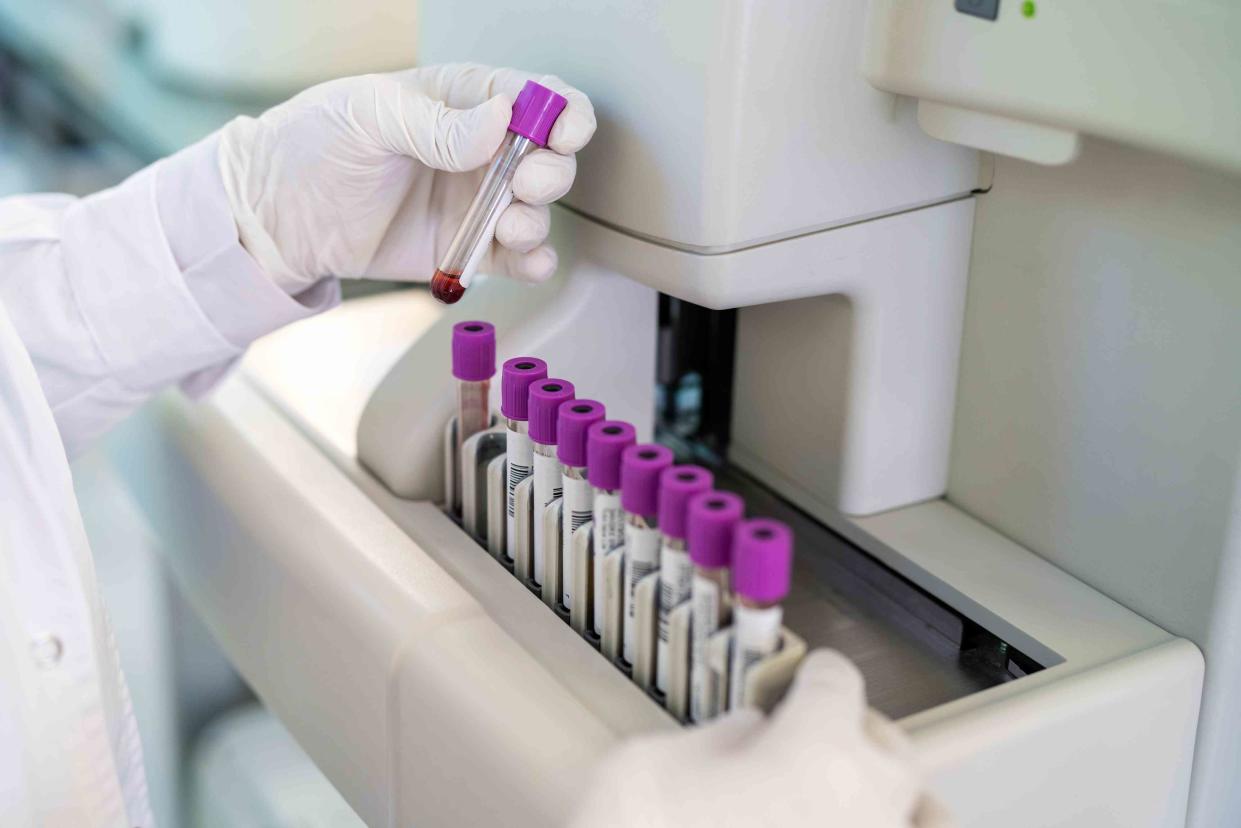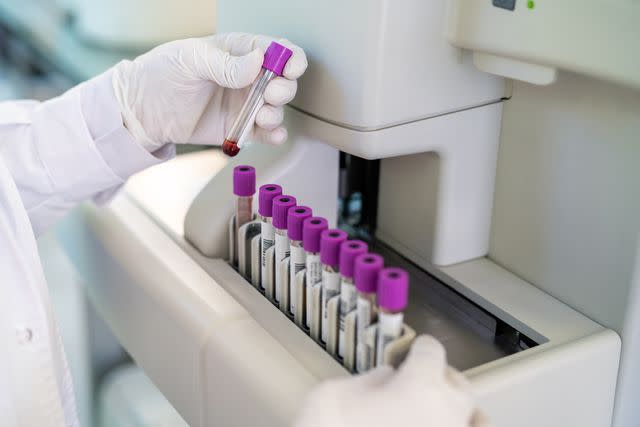High Homocysteine: What Does It Mean?

alvarez / Getty Images
Medically reviewed by Josephine Hessert, DO
Homocysteine is an amino acid that your body makes when you digest protein. High homocysteine in the blood might indicate a lack of folic acid, vitamin B12, and vitamin B6 or that the body isn't processing homocysteine effectively.
This article will review what homocysteine levels reveal about your health, homocysteine function, what foods and medications might cause high homocysteine levels, and when to take a homocysteine test.

alvarez / Getty Images
What Homocysteine Levels Reveal About Your Health
Homocysteine, an amino acid the body uses to produce proteins, should usually remain at low levels. This is due to the quick breakdown of homocysteine by essential B vitamins such as B12 (cobalamin), B6 (pyridoxine), and vitamin B9 (folic acid, the synthetic form of folate) to form other substances necessary for the body.
Elevated homocysteine levels could indicate a malfunction in this process or a deficiency in specific B vitamins. This condition may also cause harm to the interior lining of arteries and increase the risk of blood clot formation, leading to heart attack, stroke, or other heart and blood vessel ailments.
Low Homocysteine Levels
Low levels of homocysteine are generally considered to be a good thing, as high levels are associated with an increased risk of cardiovascular disease and other health problems. However, extremely low homocysteine levels are also a concern, as they may indicate an underlying health condition. If your levels are extremely low, discuss this with your healthcare provider.
Normal Homocysteine Levels
Homocysteine levels can differ among genders. A typical; however, a normal level is less than 15 micromoles per liter (mcmol/L).
Elevated Homocysteine Levels
Levels that surpass 15 mcmol/L are called hyperhomocysteinemia. Elevated homocysteine levels indicate a disturbance in the homocysteine metabolism process.
The levels of high homocysteine include:
Moderately high: 15–30 mcmol/L
Medium high: 30–100 mcmol/L
Severe: Above 100 mcmol/L
Homocysteine Function
Homocysteine is an essential amino acid that plays a crucial role in maintaining cellular homeostasis in our bodies. It is produced during the metabolism of another amino acid called methionine. Homocysteine is normally metabolized and converted into other amino acids or into other compounds that the body can use.
However, when the metabolism of homocysteine is disrupted, high levels of homocysteine can accumulate in the blood, which can be harmful to your health.
What Foods Cause High Homocysteine Levels?
There are several dietary factors that may increase homocysteine levels. But the evidence shows that it's actually what you don't eat that can lead to high homocysteine levels.
High homocysteine levels are most commonly seen in people who have a low intake of vitamin B12, vitamin B6, or folic acid. Eating foods rich in these vitamins can help your body break down homocysteine. Without them, homocysteine levels rise.
Research also shows that drinking four or more cups of coffee per day can increase levels of homocysteine.
What Medications Cause High Homocysteine Levels?
Certain drugs can cause an increase in homocysteine levels, which can include:
Methotrexate: A disease-modifying antirheumatic drug (DMARD) used to reduce the activity of the immune system for people with certain inflammatory health conditions
6-azauridine: An antitumor medication
Niacin (nicotinic acid): Vitamin B3
Bile acid sequestrants: Cholesterol-lowering medication
Anticonvulsant medications: Treat seizure disorders such as epilepsy
When to Take a Homocysteine Test
Healthcare providers typically don't advise routine testing of homocysteine levels to screen for heart disease risk in the general population. Researchers are unsure of how much homocysteine levels impact heart and blood vessel diseases. Also, studies have not shown that reducing homocysteine levels decreases the likelihood of heart attacks or strokes, leading to the recommendation against routine testing.
Your healthcare provider may recommend a homocysteine test if you are malnourished, are an older adult, or have a history of alcohol use or drug addiction. They may also suggest a homocysteine test if you display symptoms indicating a vitamin B12 or folic acid deficiency. These symptoms can range from mild to severe and include:
Light-headedness
Weakness
Frequent headaches
Heart palpitations
Skin color or fingernail color changes
Mouth sores
Tingling or numbness in the extremities
Your provider may also recommend a test to check for homocystinuria, an uncommon genetic disease that prevents the body from using an essential amino acid to create vital proteins. It can cause issues with eyesight, blood clots, and brittle bones. Symptoms appear during the first year of life or later in childhood.
Additionally, your provider may recommend a homocysteine test if you have any of the following:
The presence of one or more risk factors for heart attack or stroke, including high levels of low-density lipoprotein (LDL) cholesterol (considered "bad" cholesterol) or hypertension (high blood pressure)
A history of heart attack or stroke
It is essential to consult with your healthcare provider regarding any concerns about your vitamin levels and to discuss the appropriateness of a homocysteine test.
How to Lower Homocysteine Levels
If you have high levels of homocysteine, your healthcare provider may recommend dietary changes to help bring them down. It's essential to maintain a balanced and healthy diet that provides your body with necessary vitamins and minerals. However, if you're considering taking vitamin supplements, consult with your healthcare provider first to avoid any potential adverse effects.
Food high in folic acid and other B vitamins appears to help reduce high homocysteine levels. In a randomized trial of 65 participants with high homocysteine levels, daily consumption of folic acid supplements and folic acid–fortified breakfast cereals were found to be effective in reducing homocysteine levels.
Foods that provide folic acid include:
Fruits
Enriched grain products and breads
Peas
Nuts
Dried beans
Risks of Unmanaged High Homocysteine Levels
Elevated concentrations of homocysteine can harm the lining of your blood vessels, leading to a heightened susceptibility to blood clots. Consequently, this may elevate the chances of cardiovascular ailments such as heart attack, stroke, and various other disorders of the blood vessels.
Increased levels of homocysteine in the blood can be a risk factor for various health conditions. Here are some key points regarding the role of homocysteine in different population groups:
During pregnancy, increased levels of homocysteine have been associated with an elevated risk of negative pregnancy outcomes such as:
Delivering a baby with small size for gestational age
Preeclampsia (a condition causing high blood pressure that can lead to organ failure)
Having a low birth weight baby
Intrauterine growth restriction (a condition in which a fetus does not grow as expected)
In children, high homocysteine levels are associated with:
In older adults, homocysteine has been linked to:
Cardiovascular diseases
Neurodegenerative diseases (nerves in the brain and spinal cord stop working or die)
Osteoporosis (bone mineral density and bone mass decrease, causing brittle bones)
A decline in physical function
One 2017 study of 1,101 adults indicated that higher levels of homocysteine are associated with lower muscle strength in women age 50 years or older who are otherwise healthy.
Summary
High homocysteine levels may cause harm to the interior lining of arteries, increase the risk of blood clots, and increase the chances of a heart attack, stroke, or other medical conditions. If you have high homocysteine levels, your healthcare provider may advise altering your diet to help manage the situation.
Consuming a well-balanced diet may help provide the necessary vitamins in appropriate quantities. However, talk to your healthcare provider before taking vitamin supplements. Research has yet to definitively confirm whether lowering homocysteine levels can actually decrease the risk of heart attack or stroke.

